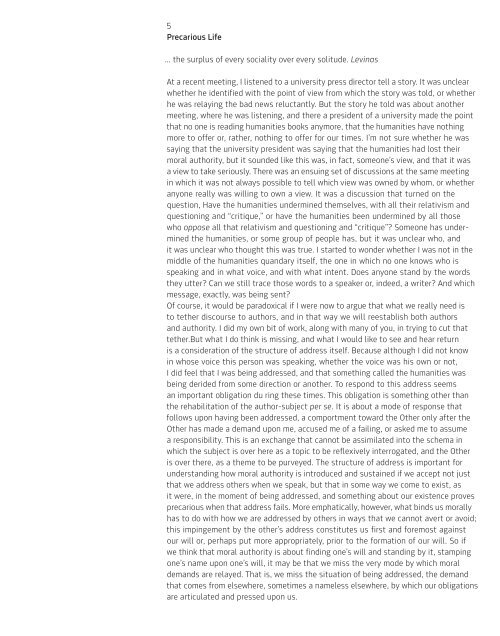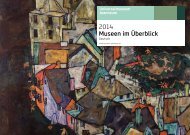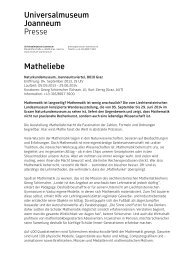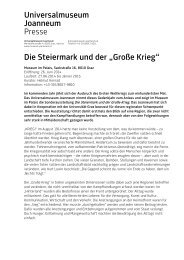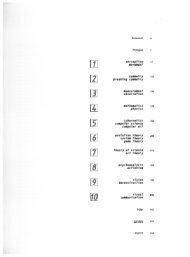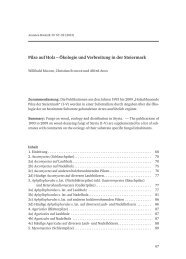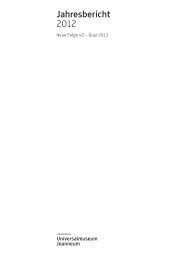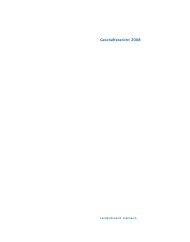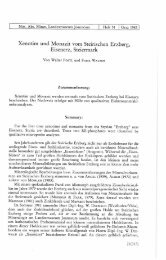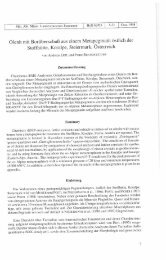Human Condition - Universalmuseum Joanneum
Human Condition - Universalmuseum Joanneum
Human Condition - Universalmuseum Joanneum
Erfolgreiche ePaper selbst erstellen
Machen Sie aus Ihren PDF Publikationen ein blätterbares Flipbook mit unserer einzigartigen Google optimierten e-Paper Software.
5<br />
Precarious Life<br />
… the surplus of every sociality over every solitude. Levinas<br />
At a recent meeting, I listened to a university press director tell a story. It was unclear<br />
whether he identified with the point of view from which the story was told, or whether<br />
he was relaying the bad news reluctantly. But the story he told was about another<br />
meeting, where he was listening, and there a president of a university made the point<br />
that no one is reading humanities books anymore, that the humanities have nothing<br />
more to offer or, rather, nothing to offer for our times. I’m not sure whether he was<br />
saying that the university president was saying that the humanities had lost their<br />
moral authority, but it sounded like this was, in fact, someone’s view, and that it was<br />
a view to take seriously. There was an ensuing set of discussions at the same meeting<br />
in which it was not always possible to tell which view was owned by whom, or whether<br />
anyone really was willing to own a view. It was a discussion that turned on the<br />
question, Have the humanities undermined themselves, with all their relativism and<br />
questioning and “critique,” or have the humanities been under mined by all those<br />
who oppose all that relativism and questioning and “critique”? Someone has undermined<br />
the humanities, or some group of people has, but it was unclear who, and<br />
it was unclear who thought this was true. I started to wonder whether I was not in the<br />
middle of the humanities quandary itself, the one in which no one knows who is<br />
speaking and in what voice, and with what intent. Does anyone stand by the words<br />
they utter? Can we still trace those words to a speaker or, indeed, a writer? And which<br />
message, exactly, was being sent?<br />
Of course, it would be paradoxical if I were now to argue that what we really need is<br />
to tether discourse to authors, and in that way we will reestablish both authors<br />
and authority. I did my own bit of work, along with many of you, in trying to cut that<br />
tether.But what I do think is missing, and what I would like to see and hear return<br />
is a consideration of the structure of address itself. Because although I did not know<br />
in whose voice this person was speaking, whether the voice was his own or not,<br />
I did feel that I was being addressed, and that something called the humanities was<br />
being derided from some direction or another. To respond to this address seems<br />
an important obligation du ring these times. This obligation is something other than<br />
the rehabilitation of the author-subject per se. It is about a mode of response that<br />
follows upon having been addressed, a comportment toward the Other only after the<br />
Other has made a demand upon me, accused me of a failing, or asked me to assume<br />
a responsibility. This is an exchange that cannot be assimilated into the schema in<br />
which the subject is over here as a topic to be reflexively interrogated, and the Other<br />
is over there, as a theme to be purveyed. The structure of address is important for<br />
understanding how moral authority is introduced and sustained if we accept not just<br />
that we address others when we speak, but that in some way we come to exist, as<br />
it were, in the moment of being addressed, and something about our existence proves<br />
precarious when that address fails. More emphatically, however, what binds us morally<br />
has to do with how we are addressed by others in ways that we cannot avert or avoid;<br />
this impingement by the other’s address constitutes us first and foremost against<br />
our will or, perhaps put more appropriately, prior to the formation of our will. So if<br />
we think that moral authority is about finding one’s will and standing by it, stamping<br />
one’s name upon one’s will, it may be that we miss the very mode by which moral<br />
demands are relayed. That is, we miss the situation of being addressed, the demand<br />
that comes from elsewhere, sometimes a nameless elsewhere, by which our obligations<br />
are articulated and pressed upon us.


